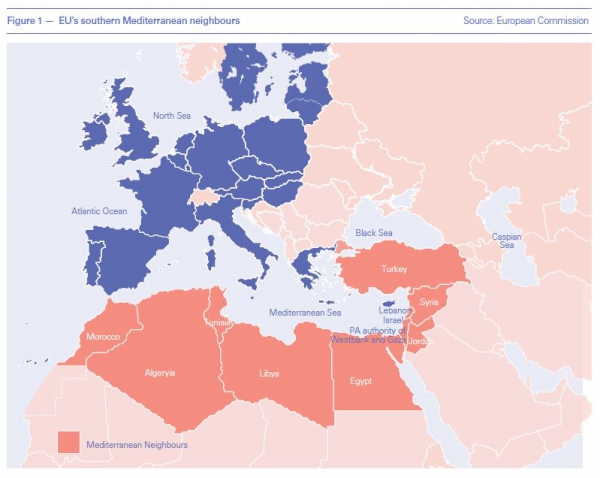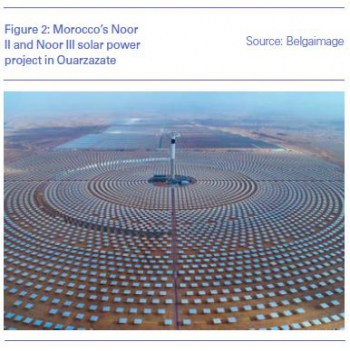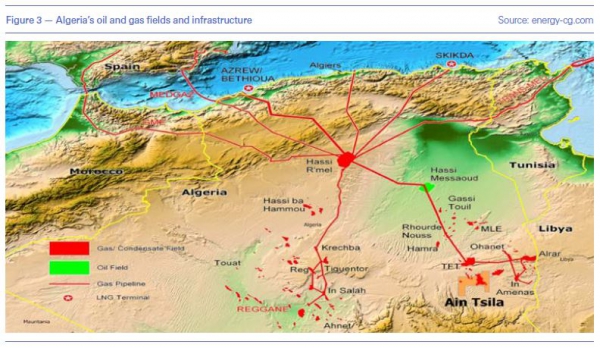EU's new Mediterranean Agenda [NGW Magazine]
Following consultations with the southern Mediterranean countries, the European Commission (EC) launched its new, ambitious, ‘Agenda for the Mediterranean’ February 9. The countries included in this scheme are: Algeria, Egypt, Israel, Jordan, Lebanon, Libya, Morocco, Palestine, Syria, and Tunisia (Figure 1).
It addresses the usual objectives such as peace, security and the rule of law; but it also considers the green transition, climate resilience, energy and the environment.
The agenda is backed up by a dedicated Economic and Investment Plan (EIP) to spur the long-term socio-economic recovery in the region. Under the new Neighbourhood, Development and International Cooperation Instrument (NDICI), up to €7 ($8.5)bn has been allocated for the implementation of the EIP over the period 2021 to 2027. It is hoped that this could mobilise up to another €30bn in private and public investment in the region in the next decade.
Peace, security and stability in these ten southern Mediterranean countries are important to the European Union (EU) in three key areas:
- Irregular migration;
- Security in Europe’s southern flank; and
- Energy transition and supplies.
The agenda coincides with the 25th anniversary of the Barcelona Declaration that committed the EU and the southern Mediterranean countries to form a strategic partnership through “dialogue, exchange and co-operation, to guarantee peace, stability and prosperity.” The aim of the new agenda is to re-launch and strengthen this partnership.
Launching it, the EC vice-president and foreign affairs chief Josep Borrell said: “This communication sends a crucial message about the importance we attach to our southern neighbourhood. A strengthened Mediterranean partnership remains a strategic imperative for the EU.”
Migration and security
Migration and security are the key drivers behind the new agenda. In order to address these, the EU needs to contribute directly to the long-term prosperity and stability of the region, especially in the social and economic recovery from the Covid-19 crisis.
EC Commissioner for Neighbourhood and Enlargement, Olivér Varhelyi, said: “We have identified a number of priority sectors, from creating growth and jobs, investing in human capital or good governance. We consider migration to be a common challenge, where we are ready to work together to fight irregular migration and smugglers together with our partners as it is a risk for all of us. We will work together to bring real change on the ground for the benefit of both our neighbours and Europe.”
Strengthening democracy, enforcing the rule of law, defending human rights and accountable governance are the main goals. Support will also be given to address security challenges and find solutions to ongoing conflicts.
Green transition and the environment
In terms of green transition and the environment, the aim of the new agenda is to take advantage of the potential of a low-carbon future, protect the region's natural resources and generate green growth.
The share of renewables – wind and solar - in energy production is low in all countries of the region, despite the huge potential, but all have set ambitious targets. The natural partner is natural gas, the cleanest fossil fuel and in plentiful supply in the region. The EU can play a major role by using its influence, expertise, and financial resources to support this transition through EIP.
A new partnership
An important goal of the European Green Deal (EGD) is to strengthen EU’s global standing. But it will not be able to achieve its goals by acting alone. The EU will need to mobilise its neighbours and partners in what should become a shared aim. The new agenda can create ways for southern Mediterranean countries to join in EU’s decarbonisation goals and reduce their emissions.
Through this, southern Mediterranean countries can also help Europe meet its carbon emissions targets and strengthen its position globally. European investments in renewable energy in the region can provide local workforce opportunities, promote development, enhance stability in the region and help tackle migration.
The European Bank for Reconstruction & Development has been supporting renewables in the region for many years now, for example under its Southern and Eastern Mediterranean Private Renewable Energy Framework (SPREF) that started just over five years ago. This supports the generation of renewable electricity by private sector energy companies in Morocco, Egypt, Tunisia, Jordan and Lebanon.
Most countries in the region have already been engaged in the green transition, often with EU investments in renewable energy. A good example is the 580-MW Noor Ouarzazate plant in central Morocco (Figure 2). This is the world’s largest concentrated solar power facility, with vast arrays of mirrors concentrating the sun’s power to melt salt stored in a 243-metre high tower at the centre of the facility. It was built with Spanish technology, with some of the $2.5bn in financing coming from Europe.
The EU should also promote new electrical interconnections across the Mediterranean, to foster an integrated electricity market. There is already significant electrical interconnection between Morocco and Spain, including an agreed roadmap to expand this further. This was initially used to import electricity from Spain to Morocco but by 2019 Morocco started using it to export electricity to Spain. Other examples are the EuroAsia and EuroAfrica interconnectors that would connect Israel and Egypt to Europe through Cyprus and the Elmed interconnector that would connect Tunisia to Europe – already receiving support from the EC as projects of common interest (PCIs).
The EU should also promote hydrogen projects in southern Mediterranean countries. These could contribute to Europe’s hydrogen strategy and help develop both European industrial leadership and local economies. Both blue hydrogen, by converting natural gas, and green hydrogen, through electrolysis, can be produced using plentiful renewable power. With abundant wind and sun, as well as land and manpower resources, north Africa should be able to produce green hydrogen, and blue hydrogen during transition, more cheaply than most European rivals. Hydrogen can be stored and transported cost-effectively over long distances using existing gas export pipelines to Europe.
Germany’s ministry for economic co-operation and development (BMZ) has already signed an agreement with Morocco focusing on two projects. The first is a new facility to produce green hydrogen and Power-to-X products and the second will promote knowledge transfer and skills training in partnership with the Moroccan Research Institute for Solar Energy and New Energies.
Creating a long-term hydrogen industry would be a geopolitical positive because it would give southern Mediterranean countries something to sell to Europe, which should be in the interest of the EU.
Natural gas
The southern Mediterranean countries involved in this scheme are important natural gas and LNG suppliers to the EU. In 2018 Algeria exported about 33bn m³ natural gas and 13.5bn m³ LNG, while Libya exported 4.3bn m³ natural gas to the EU, comprising about 13% of EU’s natural gas imports that year. Most of this gas goes to Spain, Italy and Portugal.
Algeria is the third largest natural gas supplier to the EU after Russia and Norway. Its gas is exported to Europe through the Medgaz and Gazoduc Maghreb Europe pipelines; and to Italy through the TransMed pipeline (Figure 3).
In the longer term, these pipelines can also be used to transport hydrogen from North Africa to Europe, thus ensuring that expensive infrastructure has future use.
Algeria continues to face internal challenges, social unrest, instability and a faltering economy, exacerbated by Covid-19. There is also a great deal of youth frustration over the lack of political reform and chronic unemployment.
Despite agreeing to an interim government, the Libyan crisis remains unresolved. However, a road-map has been agreed and, if upheld, democratic national elections will be held in December. This offers a real chance for national reconciliation and renewal.
Following resumption of LNG exports, Egypt exported about 2bn m³ LNG to Europe in 2019. With the re-opening of the Damietta liquefaction plant earlier in February, Egypt aspires to increase these.
But Egypt is also facing internal challenges. Human Rights Watch said in its 2021 report that there is no end to escalating repression in the country.
Clearly, with so many problems and challenges natural gas exports from the region to Europe remain under threat. The new agenda’s key policies and their successful implementation are timely and essential in addressing such issues.
Natural gas also plays a major role in domestic energy production in all countries of the region. During energy transition it can replace oil and coal, thus reducing emissions, and enable the development of renewables. As such it should be supported by the EU.
Challenges
The protracted conflicts in most countries of the southern Mediterranean region constitute a key obstacle to political stability and sustainable development. Joint efforts to prevent and resolve conflicts, promote security co-operation, mitigate the consequences of conflicts and address their root causes must be prioritised in the new agenda in order to protect people and provide them with employment opportunities.
Conflicts that need addressing include Syria, Libya, the Sahel region, Western Sahara, repression in Egypt and the near-collapse of the economy and governance in Lebanon. On the positive side, the EU should seek to encourage and build upon the recent establishment of diplomatic relations between Israel and a number of Arab countries.
Another challenge is that the EU’s influence in southern Mediterranean countries is increasingly being contested by China, which is engaging in a serious campaign of economic competition in the region, particularly in the energy sector in Morocco, Algeria, Tunisia and Egypt. This makes implementation of the new agenda even more critical and urgent.
There are also the ongoing maritime disputes in the eastern Mediterranean. In co-operation with the new US government, the EU needs to support peaceful dialogue and resolution of these disputes based on international law.
The EIP, set up to help implement the agenda, will invest in projects that contribute to recovery efforts, increase competitiveness and underpin sustainable and inclusive growth. But given the challenges the region is facing, including lack of transparency and corruption, “due diligence, environment and cost benefit assessments will [need to] be carried out to ensure that proposed projects contribute to the objectives set in the Joint Communication. Financing could also be contingent on governance efforts, in order to ensure initiatives’ sustainability and access for all.”
A joint renewables, energy and hydrogen approach would create economic development, jobs and social stability in North African countries, potentially reducing the number of economic migrants from the region to Europe.






